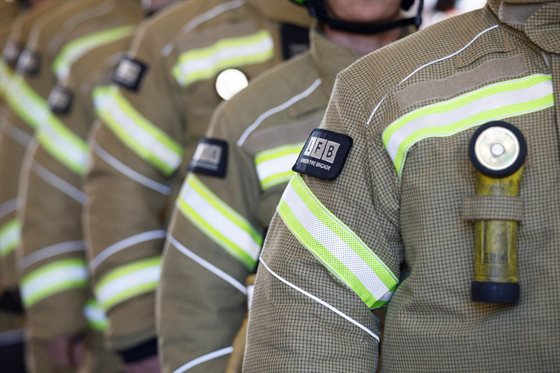Firefighters working for the busiest fire and rescue service in the UK will receive expert training from a De Montfort University Leicester (DMU) scientist who specialises in the flammability of skincare products and fire investigation.
Dr Sarah Hall, Senior Lecturer in Forensic Analytical Chemistry and Forensic Science at DMU’s Leicester School of Pharmacy, was contacted by the London Fire Brigade to share her expertise as part of their training package, to help firefighters better understand the link between skin creams and fatal burns.

The collaboration comes after Dr Hall’s research proved that fabrics with skin creams and lotions dried on can catch fire significantly faster than clean material and therefore pose a serious risk of injury or even death.
“I am honoured to be working with the London Fire Brigade,” said Dr Hall. “Firefighters can help us to get a truer picture of what the cause of a fire might be and the more information we have, the more research we can do.”
Dr Hall is recording a series of videos for the LFB, detailing her work and explaining how fire investigation makes a huge difference to the research being done. The short films will be incorporated in the online training provided to new and existing firefighters at the brigade.
“While fatal fires receive a high level of investigation the London Fire Brigade are continually working to understand how accidental fires and injuries can be prevented,” said Dr Hall.
“Our research proves that there is a link between skin creams and fatal burns, but we need more information to further our work and firefighters play a huge part in helping us do that.
“Whenever they attend an incident, even if it is ruled to be accidental, it would be incredibly useful to know more information about the cause, especially if skin creams were involved.”
Sharon Biggs, Care, Health and Safeguarding Manager in Community Safety at the London Fire Brigade, said: “We are producing an emollient training video for firefighters which will help them to understand how fire risk increases when emollients or skin creams are placed near a heat source or naked flame.
“Dr Sarah Hall has been working with the National Fire Chiefs Council (NFCC) in an advisory role for a number of years and we believe that her expertise and research will add an integrity to our own training package based on scientific data that supports our own experiences in the fire service.
“The firefighter training will not only educate our own staff about the safe use of emollients and skin creams but will enable them to feel confident enough to advise individuals they visit about the increased risk and how to mitigate these.”
Since 2010 there have been 56 confirmed fire deaths linked to emollient creams in England. A review found that those most at risk tend to be over 60, smokers and have reduced mobility.
Thousands of people use emollient creams daily to manage dry, itchy or scaly skin conditions such as eczema and psoriasis, so they are easily transferred from skin on to clothing and bedding. The creams alone are not flammable, nor are they flammable when on the body.
However, the fire risk increases with every application of the cream as it transfers, dries and builds up on the fabric. Some cream remains even when the items are washed, so it’s important to minimise the risk in additional ways, such as removing long sleeved or loose clothing before cooking or using a safety lighter.
RELATED NEWS
Experts warn of link between skin creams and fatal burns
Join us for our next Digital Open Day
Learn more about our Forensic Science course
“Our own constantly evolving data collection, which is even more focused on the details around accidental fires, also means that our prevention work can be even more closely monitored and directed,” added Sharon.
“Dr Sarah Hall’s work has been an invaluable addition to the ongoing prevention work that we carry out and we are extremely grateful to be able to use the very latest advice for our training package.”
In 2018, as a direct result of Dr Hall’s work, the Medicines and Healthcare products Regulatory Agency (MHRA) recommended that labelling of emollients and similar prescribed products should have larger, clearer and more visible warnings had to be printed on packaging to encourage safer use and highlight the fire risk.
Earlier this year, to further raise awareness of the dangers associated with emollients, Dr Hall, the London Fire Brigade and the MHRA partnered with the NFCC for a new campaign called #KnowTheFireRisk.
The MHRA recommends that anyone in the high-risk group, or their carers, should arrange a fire service assessment of their personal surroundings. They are also urged to exercise caution when close to naked flames or potential ignition sources (for example, lighting a cigarette).
Posted on Tuesday 3 November 2020